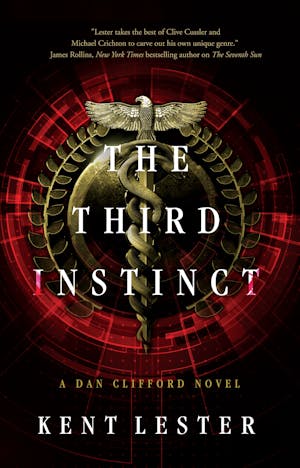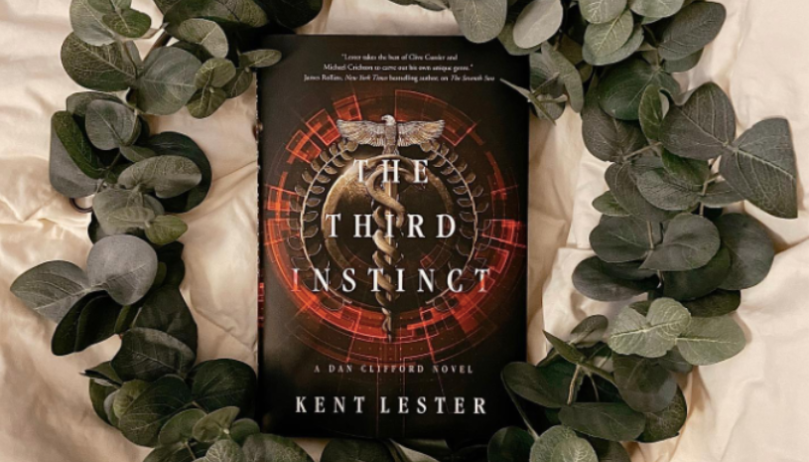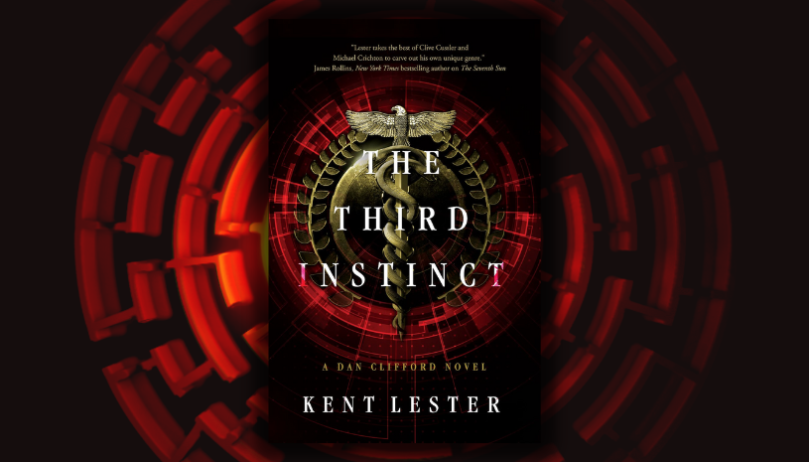 A high-octane thriller that sets Dan Clifford against ancient secret societies vying for power in the modern world; in the vein of Dan Brown’s Robert Langdon series.
A high-octane thriller that sets Dan Clifford against ancient secret societies vying for power in the modern world; in the vein of Dan Brown’s Robert Langdon series.
In The Third Instinct, author Kent Lester brings his signature blend of cutting-edge science, history, and pulse-pounding action to the next Dan Clifford adventure.
Read below to see Kent’s take on what it means to write about heroes with flaws—ones grounded in reality and who are easy to relate to.
By Kent Lester:
What type of fiction? Over the top, or realistic? That is a question most authors ask themselves before starting a new thriller series. There is a place for both writing styles, but my favorite is “near science fiction,” a fantasy world realistic enough to imagine happening in the near future.
When an author chooses a fictional writing style, nothing anchors the story in reality or sends it into the realm of fantasy more effectively than the choice of hero. Is the hero an ordinary guy or a superhero? The trend lately has been toward superheroes, characters occupying a fantastical setting that barely resembles the “real world.” This trend has probably been influenced by the rise in cinematic special effects and the popularity of the comic book universe. In high concept movies, heroes are often gifted with incredible abilities, over-the-top talents, and often, the power to alter reality itself.
Think Superman or Wonder Woman. The antics of superheroes can often stretch credulity, but their superhuman abilities do make for impressive cinematic special effects, spectacular visual imagery, and lots of action. Sure, all those special effects and superhuman feats can stretch the imagination, but often at the cost of empathy and identification with the hero. And naturally, superheroes beget super villains, and soon the entire story premise becomes an overwrought graphic novel. Movies with an excess of special effects encourage passive viewing and a bored audience. With little emotional involvement in the characters, a flashy story is easily forgotten.
The most enduring movies are ones with a realistic premise and flawed, reluctant heroes. Think John McClain in Die Hard or Lisbeth Salander in The Girl with the Dragon Tattoo.
In literary storytelling, the choice of hero is even more critical. I’ve always considered books to be a far more active endeavor than movies, so much so, that I often remind my fellow writers that their novels are a shared experience. Every fictional story is a partnership between two imaginations: the author’s and the reader’s. Unlike movies with their fully formed scenes, words on a page cry out for interpretation and embellishment. The reader becomes the author’s writing accomplice, filling in the missing details that inevitably hide between the words on the page. This probably explains how two readers can often interpret a single story so differently, because their individual viewpoints influence the perceived events.
To fully embrace the importance of a story’s hero, we should reexamine the purpose of storytelling in the first place. Ever since the first adventures were breathlessly whispered around a campfire, humans have been drawn to stories. One reason is to feel in control of a world filled with random threats and challenges. Our imaginations are always in control, free to craft the outcome however we wish. We can also learn lessons from others’ mistakes. Stories also allow us to empathize with the feelings of others, to walk in their shoes and experience the story through their eyes. Most importantly, stories allow us to work through our own personal problems and fears in the relative safety of a story’s fictional universe.
That’s why I prefer my heroes to be grounded in reality, because it makes it easier to imagine myself walking around in their shoes. In the so-called “real world,” heroes are seldom born; they are made by the necessity and demands of the situation.
In my latest thriller, The Third Instinct, Dan Clifford is the consummate reluctant hero. (as are most real-world heroes) Dan just wants to return to normalcy after the Covid pandemic and share his ordinary life with his adrenaline-junkie girlfriend, Rachel Sullivan. Unfortunately for Dan, and thankfully for the reader, the real world has a different scenario in mind for Dan’s future. Circumstances will demand that Dan overcome a set of challenges two thousand years in the making. As he determines the truth in a pack of lies, he will discover the hero within himself through incredible hardships.
It is my hope that readers will be able to identify with Dan’s vision, and in doing so, imagine an adventure through their own unique viewpoints. To me, the best fiction inspires us to think about issues in the real world, and our own roles within it. If, however, you just want a good beach read or a mindless adventure, don’t worry. The Third Instinct has plenty of literary special effects and superhuman challenges to keep your imagination occupied. Enjoy!
Click below to order your copy of The Third Instinct, available now!








